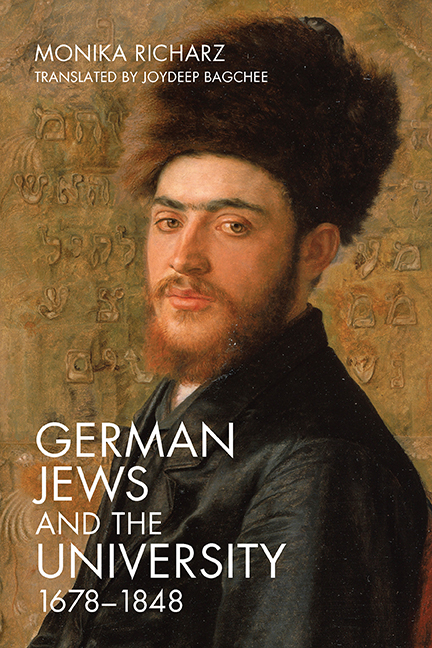Book contents
- Frontmatter
- Dedication
- Contents
- Foreword to the English Edition
- Foreword to the German Edition
- Preface to the German Edition
- Translator’s Note
- List of Abbreviations
- 1 Jewish Education in the Enlightenment Era
- 2 Jewish Encounters with the University before Emancipation
- 3 Jewish Students in the First Half of the Nineteenth Century
- 4 The Social Situation of Jewish Students in the pre-1848 Era
- 5 The Professional Experience of Jewish University Graduates
- Conclusion
- Documents
- Bibliography
- Index
Translator’s Note
Published online by Cambridge University Press: 15 September 2022
- Frontmatter
- Dedication
- Contents
- Foreword to the English Edition
- Foreword to the German Edition
- Preface to the German Edition
- Translator’s Note
- List of Abbreviations
- 1 Jewish Education in the Enlightenment Era
- 2 Jewish Encounters with the University before Emancipation
- 3 Jewish Students in the First Half of the Nineteenth Century
- 4 The Social Situation of Jewish Students in the pre-1848 Era
- 5 The Professional Experience of Jewish University Graduates
- Conclusion
- Documents
- Bibliography
- Index
Summary
Our universities and our schools are our churches.
—G. W. F. HegelMy real university was Auschwitz.
—Joseph WulfMONIKA RICHARZ REQUIRES little introduction. She is one of the most important historiographers of German-Jewish history, and a recognized authority on Jewish social life in Germany before the Holocaust. Her three-volume work Jüdisches Leben in Deutschland: Selbstzeugnisse zur Sozialgeschichte, based on materials collected from the archives of the Leo Baeck Institute New York, during her time as a researcher there, is a standard reference work familiar to all students of the field. But it is her pioneering role in advancing the debate on German anti-Semitism that will particularly stand out in memory. As Christhard Hoffmann notes in his review of German-Jewish historiography, following the revelations about the extent of German involvement in the Holocaust in the early years of the Federal Republic (the Ulm trial in 1958, the Frankfurt Auschwitz trial from 1963 to 1965), it was not the “historical establishment,” but “individuals from the generation of assistants and students, such as Werner Jochmann, Reinhard Rürup, Stefi Jersch-Wenzel, Monika Richarz and Arno Herzig, who followed these impulses and addressed questions of Jewish history and especially antisemitism.”
But despite Richarz's international prominence, a significant part of her work, her doctoral dissertation, has not received the attention it deserves outside of Germany. The dissertation was originally published in 1973 by the Leo Baeck Institute, London, with the title Der Eintritt der Juden in die akademischen Berufe: Jüdische Studenten und Akademiker in Deutschland, 1678–1848. Richarz's book is still considered the standard work on the subject and is widely cited (compare Feiner's foreword in this volume). But the lack of an English translation has meant that, in the English-speaking world, as a rule, only scholars of German-Jewish historiography—mainly those who studied the Haskalah (the Jewish Enlightenment) and the role of an academized elite in the transformation of German Jewry in early modernity—are familiar with it. This is a major shortcoming, because, despite newer studies of individual figures from this period, Richarz's book remains a source of vital information about the lives, the struggles, and the legal conditions of Jewish Akademiker in this period. In this translator's note, I would like to introduce the English edition, a few important translation choices, and my reasons for translating this book entirely on my own and without financial support of any kind.
- Type
- Chapter
- Information
- German Jews and the University, 1678-1848 , pp. xxi - xxxviiiPublisher: Boydell & BrewerPrint publication year: 2022

